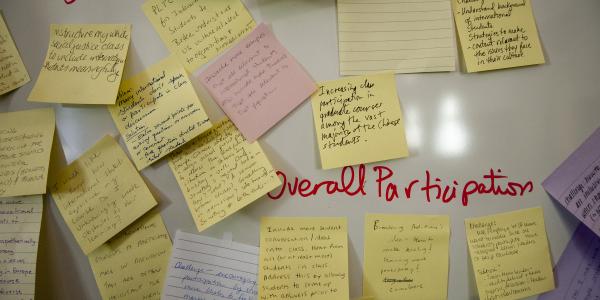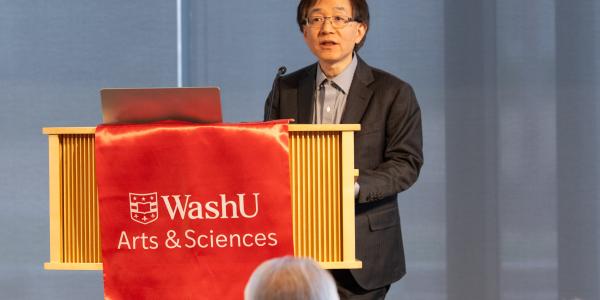On January 9, the university will hold the 9th iTeach Faculty Symposium on Teaching, which offers an opportunity for faculty across the Danforth and Medical campuses to exchange ideas about effective teaching prior to the start of the spring semester. This biennial symposium, which showcases new and innovative instructional strategies, is a collaboration between Arts & Sciences, University Libraries, and The Teaching Center, with support from the Office of the Provost.
Since its inception in 2002, iTeach has evolved from an event focused on the use of technology in the classroom to a broader engagement with all aspects of university-level instruction. This year, there will be sixteen interactive sessions on themes including strategies to foster inclusion and diversity in the classroom, ideas on how to integrate active learning and metacognitive skills to increase students’ awareness of their own learning, and a variety of new insights from recent research on teaching at Washington University. Several of the sessions will also address issues related to teaching reading, writing, and analytical skills for students in a digital age.

Fisher is excited to bring Murphy's work to the university community, saying it sheds light on efforts that already underway at Washington University (and more broadly in higher education) to create more inclusive learning environments. “We want to create an academic community where all students feel a sense of belonging and have the same opportunities to learn and to contribute to the production of knowledge,” she says. Sessions such as the one presented by Purvi Patel, assistant director of the Center for Diversity and Inclusion (CDI), and Christi Smith, assistant dean and senior scholar at the CDI, will provide faculty with ideas on how to support students who have experienced bias in the classroom or on campus.
Even with the full program, there will be dedicated time for discussion provided during the symposium breakfast, lunch, and reception. This opportunity for discussion with their peers is something many faculty have come to value, says Adrienne Davis, vice provost and the William M. Van Cleve Professor of Law, who was a plenary speaker in 2016. She stresses the importance of the event to give faculty an occasion to come together and exchange ideas. “Teaching is often an isolated activity,” Davis says. “We don’t get opportunities to share challenges and strategies the way we get to share research and scholarship. The iTeach symposium offers a rare opportunity to delve deeply into and collaborate on teaching.”
Davis adds, “Washington University faculty pride ourselves on being excellent researchers and excellent teachers. iTeach gives us an opportunity to meld the two and explore the latest scholarship and best practices on teaching. In the plenary, I welcomed the opportunity to share challenges in teaching, and hear from others, and brainstorm techniques and approaches for moving our classrooms forward.”

This spirit of collaboration on teaching includes extending connections beyond the Danforth Campus. “iTeach is really the only event where the full campus community, including those of us over across the park at the medical school, can all come together and spend a full day exchanging ideas and innovations around teaching,” says Carolyn Dufault, assistant dean for education in the Office of Education at the Washington University School of Medicine. Dufault, who served as the assistant director of evaluative studies at The Teaching Center before her current position, is particularly looking forward to a session by Tim Bono. “I’ve known Tim since graduate school, and I have watched in admiration as he has developed his enormously successful and well-received undergraduate courses on positive psychology. He is an incredible teacher, and I know participants are going to walk away with new ideas for changing up their teaching practices following his session on mindsets and resilience.”
This year, the planning committee is looking forward to another stimulating symposium. Fisher is consistently impressed with the positive feedback she and her colleagues receive on iTeach, which suggests to her how committed faculty are to improving student learning. Fisher says, “the most telling feedback we receive is the request to hold iTeach every year, rather than every other year." She adds that the biennial schedule is deliberate, however, "in that it allows faculty to try out new ideas for a few semesters before coming back to the next symposium to share what they have learned.”





